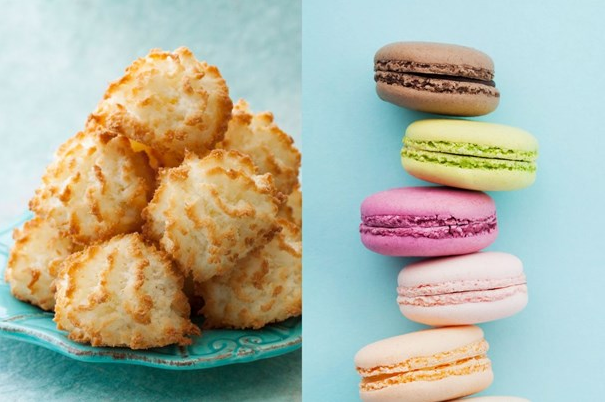Macarons v. Macaroons
March 16, 2022
Macarons and macaroons probably originated from the same recipe, that just changed over time as it traveled around the world. Macarons are the brightly-colored sandwiches everyone loves to eat but despises baking. Macaroons are drop cookies full of coconut, and actually more widespread than macarons. Both are thought by historians to have started in Italy and left with Catherine de Medici to France in the 1500s, the start of their circulation around the world. Macaroons were created when Franklin Baker discovered coconuts were much easier to ship already shredded, and then someone decided to replace the almonds in macarons with coconut, and macaroons were born.
Macarons are made with egg whites, sugar, vanilla, salt and blanched almonds. The egg whites must be whipped for this cookie to work, as they are the main leavener of the recipe, which causes the macaron to puff up. Macarons are notoriously hard to make since they are incredibly sensitive to pretty much anything. They are not your average chocolate chip cookie you make so much you no longer measure anything; these cookies take a precise measurement in order to not throw off the delicate chemistry. This chemistry is what causes the macaron to puff into a perfect dome.
Macaroons are much simpler. They use the exact same ingredients as macarons, just switch out the blanched almonds for coconut flakes. These don’t have a super sensitive chemistry, so if you are a “vanilla with an oops!” type person, you’re safe with this treat. These cookies also puff up while in the oven due to the egg whites, creating air pockets around lumps of sweet coconut.
Both macarons and macaroons are served during the Jewish Passover because neither use flour. Jews in Egypt and Syria still make the coconut-less macarons, but the macaroons have spread much farther in the Jewish community.
In short, whole macarons and macaroons still share many similarities from their origin, they are very different sweets and are enjoyed by populations across the world on special occasions and in day-to-day life.
https://www.foodnetwork.com/recipes/packages/baking-guide/macarons-vs-macaroons-whats-the-difference
https://www.myjewishlearning.com/the-nosher/why-do-we-eat-coconut-macaroons-on-passover/
https://www.newidea.com.au/macaron-and-macaroon






josh • May 19, 2022 at 9:01 pm
lit